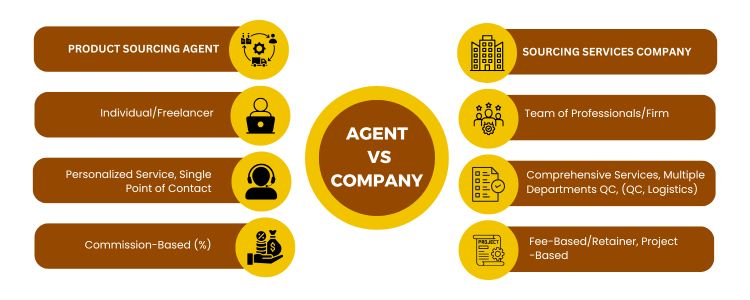How Sourcing Services Companies Manage Supplier Relationships
In today’s global economy, successful international trade is based on relationships that are not simply identifying suppliers but managing long-term, sustainable relationships. Companies in every sector will increasingly rely on sourcing services companies to help simplify the procurement experience, mitigate risk, and improve vendor relationships. The sourcing services partners function as a ‘de facto’ arm of an organization’s internal procurement team to shift supplier relationships from transactional relationships to strategic partnerships.
Why Supplier Relationships Matter in Modern Sourcing
Relationships with suppliers are not merely about negotiating price, but also about trust, compliance, risk management, and growth together. Therefore, an effective supplier relationship management system presents the following advantages:
- Consistency in Quality: A dependable supplier is a trustworthy supplier with a consistent product standard.
- Cost Effectiveness: A longer-term supply agreement typically will lead to stability in pricing.
- Access to Innovation: A strong relationship with a supplier will often lead to supplier-driven innovation.
- Resilience: A business with trusted partners has more resilience to supply chain disruptions.
Because of these imperatives, many firms will choose to partner with experts in their product sourcing companies, giving them more opportunities to explore the supplier ecosystem.
The Strategic Role of Sourcing Services Companies
Sourcing service firms, unlike independent brokers or single product sourcing agents, provide a holistic approach to managing supplier relationships. Their roles consist of:
- Supplier Identification – Vetting and identifying potential suppliers around the world.
- Contract Negotiation – Creating mutually agreeable contracts, balancing pricing and longer-term agreements.
- Compliance Management – Ensuring adherence to regulatory standards and sustainability-related standards.
- Conflict Resolution – Acting as a consultant when conflicts arise between a buyer and supplier.
- Performance Evaluation – Conducting regular audits and quality checks to track supplier accountability.
Through these roles, sourcing services design procurement into a value-added process instead of a cost-center activity.

Supplier Relationship Management Framework
The cornerstones of their business, the companies utilize structured supplier relationship management (SRM) frameworks that include three major steps:
- Supplier Onboarding
New suppliers are carefully evaluated to assess aspects of due diligence, including financial stability, factory audits, and compliance. This process is critical in global product sourcing, as cultural and regulatory issues can complicate evaluation and cause onboarding delays.
- Relationship Building
Once onboarded, the companies incorporate suppliers into their long-term business strategy, including knowledge sharing, joint planning, and collaborative product development.
- Performance Assessment
The companies monitor supplier performance against pre-defined key performance indicators (KPIs), including consistency in quality and delivery, as well as sustainability performance. Feedback loops provide opportunities for continuous improvement.
Building Trust and Transparency
Supplier relationships operate on a currency of trust. Trust develops when sourcing services companies build channels for communication that are transparent. For example, digital procurement platforms allow buyers to monitor performance data in real-time, while also offering suppliers transparency to demand forecasts. Transparency reduces the likelihood of confusion and promotes long-term collaborative relationships.
Conflict Management in Supplier Relationships
Disputes are unavoidable in global supply chains, whether due to quality, delays, or disagreements on prices. Sourcing firms can play a key role in managing disputes by:
- Clearly outlining each party’s contractual obligations from the outset.
- Being neutral intermediaries between buyers and suppliers.
- Issuing corrective action plans for repeat issues.
- Sourcing alternatives to lessen business disruptions.
Taking this proactive approach avoids disruptions from a dispute in broken partnerships.
Technology in Supplier Relationship Management
The way relationships are managed with suppliers has been altered by Digital Transformation. Sourcing firms are leveraging:
- AI and Analytics – Supplier Risk Assessment and Demand Forecasting.
- Blockchain – Transparent and wipe-proof records of the supply chain.
- Cloud Platforms – More efficient collaboration between global buyers and suppliers.
- Automation tools – Faster contract management and compliance monitoring.
By leveraging all of these tools, sourcing firms are able to increase accountability with stakeholders, eliminating a lot of the administrative burden on sourcing departments.
The Value of Local Expertise
The importance of global scale is clear, but the value of local knowledge is no less critical. Many sourcing firms leverage their regional office presence or partnerships to keep updated with local regulatory compliance, labor conditions, and cultural idiosyncrasies. In practice, a sourcing agent in India may focus on textiles or pharmaceuticals, and can put buyers in touch with vetted local networks. This combination of globalization and localization enables stronger engagement with suppliers.
Challenges in Supplier Relationship Management
Even with improvements, managing suppliers is still challenging:
- Regulatory Uncertainty – Changing compliance requirements across countries.
- Cultural Barriers – Misalignment in business practices across countries.
- Sustainability Pressures – The rise of eco-friendly and ethical sourcing.
- Overdependence Risks – Over-reliance on a supplier or geography.
In this case, sourcing firms assist companies in finding more suppliers while implementing checks and balances.
Future of Supplier Relationship Management
In the future, relationships with suppliers will continue to evolve into strategic partnerships in response to:
- Sustainability Imperatives – Buyers will be incentivized to use suppliers with clear environmental and ethical practices.
- Collaborative Innovation – Suppliers will increasingly be seen as co-creators in addition to manufacturers.
- Risk Resilience – Suppliers will provide a solution to globalization through diversified sourcing to address supply chain disruptions.
- Data-Driven Governance – More sophisticated predictive data and analytics will enhance skills on suppliers’ delivery and risks of delivery to the business.
These trends are motivating businesses across industries to partner with sourcing service firms to respond to market volatility.
Conclusion
As we make our way into 2025, Leather Footwear is at the again of a line of tradition and change. Established practices are offered within a framework of sustainability, providing for the same vast opportunities for retailers and distributors to find their niche within new trends. It is a dynamic and global market space where sustainability practices and new luxury markets are being developed outside of European borders. Success will come from changes in sourcing, e-commerce capabilities, and making sure consumer trust remains a priority. Those that are willing to adapt their business practices will not only carve out their own space within the Footwear Supply feel it should be waiting to welcome brands back to shoes and footwear, and to retailers interested in making a new investment in footwear and shoes with relationships with their customers.
Frequently Asked Questions (FAQ)
Sourcing services companies are professional firms that assist businesses with supplier relationship management, with an emphasis on efficiency and compliance, enjoying a long-term relationship and collaboration.
Agents usually manage single transactions, whereas sourcing companies create a working relationship with suppliers by employing a complete supplier relationship management process with strategic oversight.
Because trust and compliance help assure quality, minimize risk, and ensure delivery performance.
Technology provides transparency, risk monitoring, and automates and enables collaboration between buyers and suppliers across borders.
Sourcing services firms help mediate disputes, enforce contractual obligations and formalize a corrective actions plan, whilst assuring business continuity.
No. Small and medium-sized enterprises will also leverage the knowledge of sourcing services companies and access to their network to connect to global suppliers without excess overhead.









